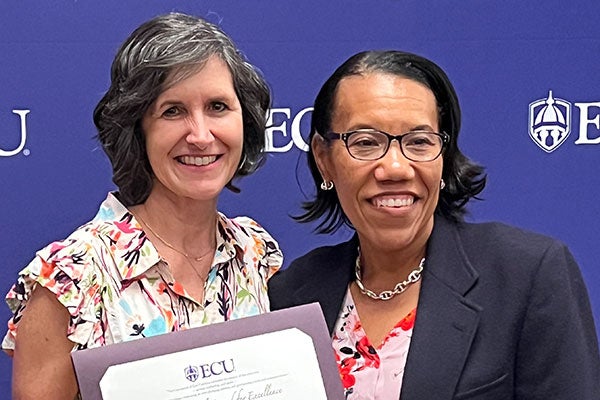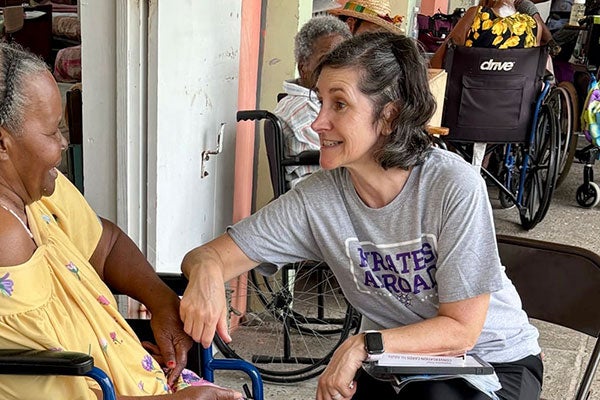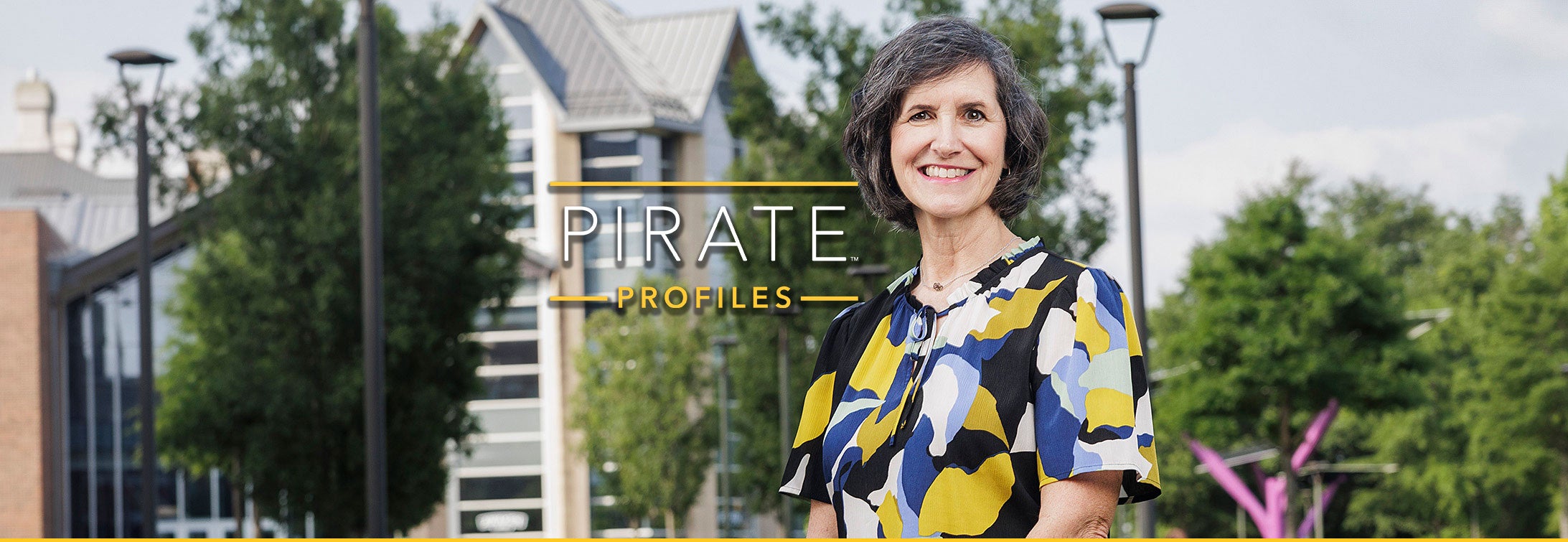Faculty: Sherri Winslow
Sherri Winslow never had to go too far from home to change the world.

Sherri Winslow, left, received ECU’s Centennial Award for Leadership. (Contributed photo)
Her family — she was raised in a farming community near Elizabeth City — grew corn, wheat and soybeans. From time to time, they raised cattle; she was thoroughly a farm girl.
“I learned to drive a tractor early on, and pulled weeds from the fields,” Winslow said.
As a high school senior, she took advantage of job shadowing opportunities, and a career aptitude test recommended a career in a helping field.
Winslow’s parents encouraged her, and her older brother, to pursue their education. He was the first in their immediate family to attend college, and she followed a few years later, graduating from UNC-Chapel Hill with a degree in speech-language pathology (SLP).
The transition to college life wasn’t as easy, Winslow said. Being a first-generation student meant not knowing what office hours were or learning how to study and adjust to the demands of being newly independent and responsible.
Going into her undergraduate years, she thought pediatrics would be her focus, but after being accepted into the graduate speech language pathology program at Chapel Hill, her focus shifted to adult populations, and an exploration of the more medical aspects of the profession.
“Learning about anatomy and how things work with swallowing was intriguing to me,” Winslow said.
While a student, she had a number of clinical experiences at hospitals and long-term care facilities around the Triangle, working under the supervision of experienced SLPs. She worked with acute-care patients, those who had suffered strokes and needed to be assessed for swallowing concerns and the ability to communicate.
Her focus then was on the patients, but looking back at her early training, she now understands the importance of educating the families and caregivers who will be with those patients once they are able to return home.
“I’ve now experienced acute care situations with my family members; being on the other side, I can appreciate the time a provider takes to learn about the patient and give us information,” Winslow said.
Professional life
Winslow’s first job after grad school was working in home health care in the communities surrounding Beaufort. Most of her case load was working with kids, and it was well before there were computers to help with completing notes at the end of the day, and before preparing for the next.
“I had not experienced home health during graduate school. As a young professional, it was a learning experience,” Winslow said.
After a few years she and her husband returned to northeastern North Carolina, to be nearer to family and to work at the hospital where she was born. She focused on sharpening her skills and caring for adults and established a stroke support group, which helped patients and the family members who are with them through their recovery.
Soon thereafter, they moved to Kinston, where Winslow did part-time work in skilled nursing facilities and what is now UNC Health-Lenoir as she raised her two young sons. A bit of serendipity, though, is what ultimately brought her to ECU.
“A family member ended up having a cochlear implant done and came here to the clinic to see the audiologist and speech therapist before and after the surgery,” Winslow said. She volunteered to join the appointment — her education and clinical experience made her an invaluable second opinion and translator of medical language.
Winslow had previously applied to a vacancy at the Department of Communication Sciences and Disorders, but the only opening at the time was in pediatrics and that wasn’t the right fit. During her visit with her family member, she met then-clinic director, Dr. Betty Smith, who remembered her name and needed someone to supervise graduate students working with the clinic’s adult patients.
Her sons were both old enough for her to take on a new role, so she jumped at the offer.
Leading Students, Changing Lives

Winslow speaks to a patient during a study abroad trip to Dominica with ECU students.
Since, 2009, Winslow has led an aphasia group for patients who have lost their ability to speak fluidly as a consequence of a stroke or brain injury.
“I enjoy helping students understand what aphasia means, the impact of aphasia, and how to work with the person and family on their goals. This also applies to helping people with voice or swallowing concerns,” Winslow said.
Soon after arriving at ECU she was asked to be the department’s clinical placement coordinator, which put her into direct contact with students. Around the same time she went on a mission trip with another university, to help at a school for the deaf in Jamaica. The next year, a colleague asked her to participate in a similar program with ECU students.
“I had never traveled before 2016; I’d mainly been in the southern United States,” Winslow said, but that didn’t deter her from working with Therapy Abroad, a program that helps faculty organize study abroad trips. She soon was an expert in leading students to Belize and now, Dominica, for service learning in speech-language pathology.
In 2021, she asked to be the department’s undergraduate program director, a role she is still in, and one that gives her opportunities to meet more students, assist them in gaining clinical observations, and support them in their educational endeavors.
She’s also taken pride in being able to bring students into contact with older adults with cognitive impairments. For years her students have visited residents in local dementia care facilities, not to provide therapy as much as to learn the needs of their future patients.
“I tell them during that even though you may not think you’re going to work someone with dementia, a family member or family friend is going to be working through that. You need to understand what it’s like to communicate with someone with dementia and what techniques can help,” Winslow said.
Winslow believes that her students need to appreciate the many ways that people communicate. Sometimes a glance is just as important as speech.
“Eye contact may be the most that they’ve done with another person in a couple of days,” Winslow said.
While not obvious to many outside the profession, swallowing is a large part of the work that her students will undertake after graduation. More is now known about the mechanics of swallowing, which Winslow is thankful for, because eating is as much a social practice as a necessity of life — sharing a meal around a table and celebrating is an important part of a culture. SLPs now know more about the risks and benefits of altering someone’s diet and the importance of good oral health and along with other factors that contribute to holistic wellness.
“Navigating the swallowing issues is difficult. If tube feeding is involved, the patient or their family might need to learn how to maintain the equipment,” which Winslow said is an added stress for families already adjusting to the new normal of a chronic debilitation or long-term recovery from an illness or injury.
In April, Winslow received ECU’s annual Centennial Award for Excellence in Leadership. The honor represents the highest awards given to ECU faculty and staff for excellence in service, leadership and spirit.
Whether leading a group of students to Dominica for a therapy program or facilitating aphasia services for patients and families, Winslow embodies the Pirate spirit of service, both in her back yard and across the world.
Fast Facts
Name: Sherri Winslow
Title: Clinical assistant professor and SLP internship coordinator
Hometown: Elizabeth City
Pirate Pride
Years working at ECU: 17
What I do at ECU: Supervise SLP students in the on-campus clinic, organize clinical placements for graduate students, oversee the speech and hearing sciences major, teach professional issues course to grad students, facilitate service-learning trips for undergrad and grad students
What I love about ECU: Collaborating with allied health colleagues, providing services to people from eastern North Carolina in our clinic alongside our students, meeting students from across the country, and seeing graduates accomplish great things in their careers
Clinical interests: Aphasia, primary progressive aphasia, voice disorders, mild cognitive impairment/dementia, vocal cord dysfunction
What advice do you give to students? For undergrads — attend office hours and try different study methods; For grad students — follow experts in our field on social media, listen to podcasts, connect with mentors. Don’t stop learning!
Favorite class to teach and/or favorite teaching moment? My favorite teaching moments are when students see results from therapy intervention and make a connection to what they’ve learned in class
Quick Quiz
What do you like to do when not working? Walk in my neighborhood, spend time with my family, play the piano, read and sometimes do crafts
Last thing I watched on TV: “Severance”
First job: Babysitting
Guilty pleasure: Simply Natural Creamery’s ice cream or chocolate milk
Favorite meal: Fried chicken with mashed potatoes
One thing most people don’t know about me: Drama class was a favorite in high school and I was Miss Lynch in “Grease”
